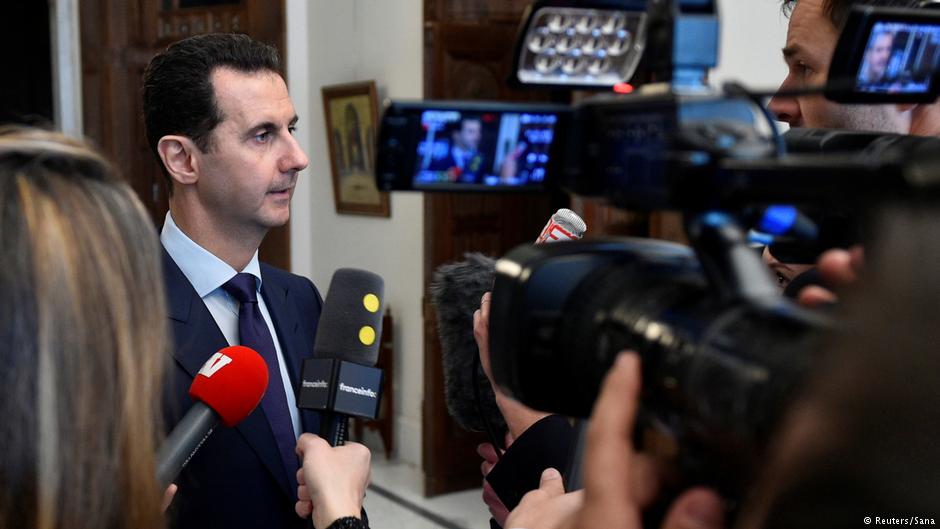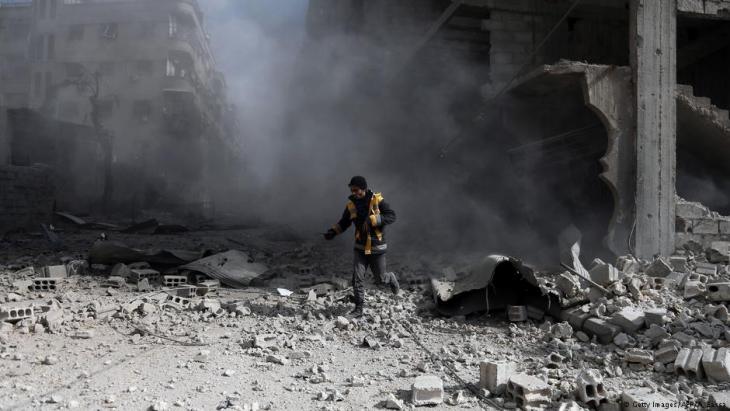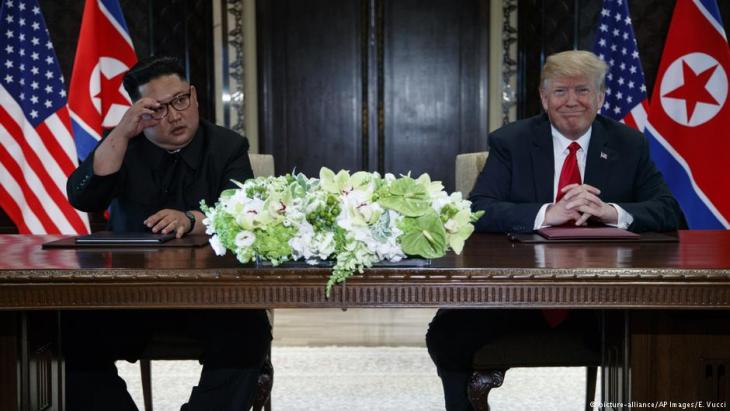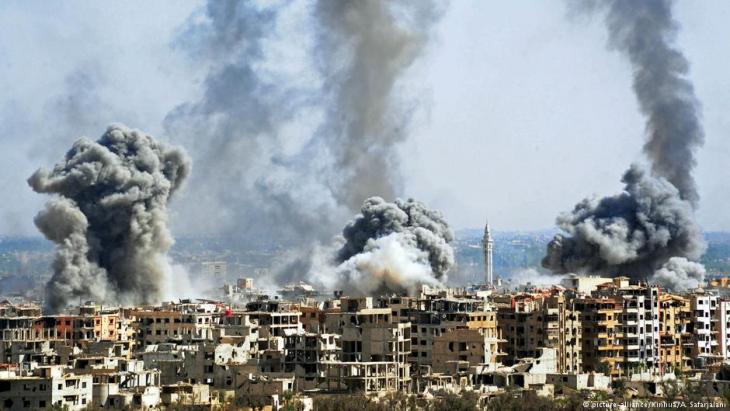Facts must be respected – even in Syria!

How often have you heard it said that truth is the first victim of war? And that – in the Syrian conflict for example – no side can be trusted as they're all simply spreading propaganda and waging a "war of images"? Probably very often. Until some newspaper readers and television viewers decided to no longer believe anything.
And some journalists resignedly turned to reporting on anything deemed to be newsworthy. Toxic gas attack in Syria? "It was Assad", say some, "it was the rebels", others claim.
Ultimately all that's left is the sense of not being able to know anything for sure, because this war presided over the death of truth a long time ago. We've already stumbled into the trap. The trap set by conspiracy theorists and disseminators of fake news, whose most ardent wish is to see anything that was ever investigated, researched, and proven end up in the post-factual graveyard. Where its grave is filled up with so many "alternative facts" that no-one knows anymore what – and above all – whom to believe and hardly anyone is bothering to dig for the truth.
But the truth does exist – and in war, most particularly. After all, it is here that crimes occur that have perpetrators and victims, so that their clarification only brings to light one truth – namely the details of the crime itself.
Don't carry the truth to the grave
The sentence about truth being the victim of war originates from the year 1914. It means that irrespective of the facts, warring parties like to spread their versions of events. This should not result in us carrying truth to the grave, but on the contrary, encourage us to search for it.
But is truth not relative? Doesn't everyone have their own truth? No, everyone has their own perception, their own viewpoint of particular events. In war, this distinction is fundamental: truth can be objectively determined, perception is subjective.
There are as many versions of the war in Syria as there are Syrians. Everyone has good reason to see things the way they do – depending on where and how they have experienced the war. Anyone living on the coast without fear of air raids, or in relative security in the northeastern Kurdish territories, has a different viewpoint to residents of eastern Ghouta or eastern Aleppo, locked in a battle with the regime for years.

Those who have become acquainted with freedom and self-determination in opposition-held regions are going to have different expectations to those people who suffered for four years under the so-called "Islamic State" (IS), only to be subsequently bombed by the United States.
Hiding behind simplified explanations
Moreoever, the Syria conflict also features the assessments of so-called experts. While these should also not be confused with the truth, they are a fundamental part of the overall debate. In the best case scenario, an expert knows the country personally, can speak the language, reads a variety of different sources and adheres to journalistic principles in his research.
Only then can he start trying to piece the puzzle together. Or in other words assess the many thousand pieces of information, opinions, views and reports on Syria on the Internet, contextualise and explain them.The more differentiated the analysis, the more difficult it is to read. That's why simplified explanations sell better, above all when they come across as self-critical – or in other words anti-western. The war in Syria is then reduced to a choice between regime change imposed by the West, a scuppered pipeline deal, or an anti-Iran intervention.
Significantly, Syrians barely crop up in these geo-strategic simulations involving secret service documents and commodities – not as actors, at least, and at most as victims of abuse and manipulation. As a result, the authors of these accounts demonstrate the exact same thing they set out to criticise: a profoundly paternalistic viewpoint. As though without the CIA, Syrians would not be in a position to rise up against an unjust regime.
The "good" versus "evil" mindset
It is first and foremost those on the left of the political spectrum and members of the peace movement who like to pick up on ideas about regime change and pipelines, because they fit into their decades-old mindset of "good" (anti-capitalist East) and "evil" (commodity-hungry imperialist West). At the same time, especially asocial aberrations of unbridled capitalism can now be found in Russia and China, while Syria represents neoliberalism and nepotism in its purest form.
Besides, there is in principle no such thing as good and evil in international politics, just interests. From a foreign policy point of view, each and every head of state pursues the interests of his or her own country or their own client base – whether Donald Trump or Kim Jong Un, Angela Merkel or Vladimir Putin. Any moral supremacy arises at most from the choice of means in the assertion of these interests, as this must take international law into account, something leaders on all sides seldom do.

Nevertheless good and evil do exist in Syria, after all whenever humans act, moral standards very much apply. A doctor who smuggles medication into a no-go area is doing something good; a mercenary who lines his pockets at a checkpoint is not.
Intelligence agency directors who regard sadistic torture in their detention centres as a legitimate intimidation method are perceived as pretty evil from a humane (not western) standpoint. Just like rebel leaders who act out their need for revenge on captive soldiers. An unarmed young man demonstrating for liberty is better than the soldier that fires on him, or his superior who forces him to do it.
Countering ideologised world views
We are in danger of losing this moral compass with regard to Syria if we pretend to know nothing, claiming that all sides have merely tried to influence our perception with manipulation and orchestration. We will end up confusing perpetrators and victims, thereby rendering a service to those truth-deniers who thankfully fall upon every Internet rumour to turn the Assad regime from perpetrator to victim. In this way, some pseudo-leftists have customised the Syrian conflict to fit their ideologised world view that pits a "democratically legitimate Syrian government" against "western imperialism".
Which brings us back to the truth. In this conflict, there are many facts that are beyond denial. The Syrian president is not legitimised through elections, as these are neither free, secret nor equal. For 43 years, the Assads had themselves confirmed in office via referendum with no opposing candidates. The entire electoral process from registration through to vote-counting is in the hands of the regime.There is also an official body of evidence on the matter of chlorine and toxic gas. Of the 39 documented cases since 2013, the independent UN commission of inquiry says the regime was responsible; clear perpetration has not been established in the remaining six cases.
Whenever sarin was deployed in Syria, it came from regime stocks. This was revealed by matching samples with material handed over for destruction by Damascus to the Organisation for the Prohibition of Chemical Weapons (OPCW). In addition, for years the UN Commission has documented targeted attacks by the regime and its supporters on civilian infrastructure, in particular hospitals, starving out civilians as a weapon of war, as well as the systematic killing of civilians in regime detention centres.
Reports by international NGOs such as Human Rights Watch, Amnesty International and Doctors Without Borders confirm the use of these methods, which legally fall into the categories of war crimes and crimes against humanity. For this reason, international arrest warrants have been issued against Assad’s personal security adviser Ali Mamlouk and the head of the Syrian Air Force Intelligence Directorate Jamil Hassan.
Increasing belief in conspiracy theories
But nevertheless, a growing number of "critical citizens" are assigning greater credibility to conspiracy theories on the Internet than to an UN investigation that is required to meet scientific standards. For example, in the case of the sarin gas attack on Khan Shaykhun on 4 April 2017 that left more than 80 people dead. Although following evaluation of all evidence – time of day, impact crater, air raid, victims' symptoms, blood and ground samples – the OPCW and UN team of experts holds the Syrian government responsible for the attack, other accounts still persist.

If these are supported by respected journalists or scientists, they appear all the more credible, even if these experts are basing their views on dubious sources and their claims are clearly refuted by the inquiry report. The lack of confidence in established institutions and media is evidently so great, that individual "truth finders" are feted as courageous underdogs, regardless of the garbage they spout.
The same goes for German professors who claim all chemical attacks took place "under a false flag" therefore placing them beyond the reach of scientific examination. For the disseminators of fake news, people wielding convictions like these are especially effective propaganda instruments. A scientist who believes the lies he is spreading is the best thing that can happen to Russia Today, Sputnik or Fox News. After all, his abstruse claims serve the purpose of every disinformation campaign: to sow seeds of doubt until the truth appears as one of several possible versions.
In the Syrian conflict, editorial offices that only announce the positions of the warring parties without taking the trouble to compare them with facts that can be easily researched become part of the game. Interviewing expert A in the morning and expert B in the afternoon has nothing to do with neutral reporting, but rather exposes editors' own inability to recognise fake news.
So how can we enforce truth in war? By making the distinction: we must try to understand perceptions, discuss analyses controversially, but facts must be respected – even in Syria.
Kristin Helberg
© Qantara.de 2018
Translated from the German by Nina Coon
This article first appeared in the taz newspaper on 17/18 November 2018.
